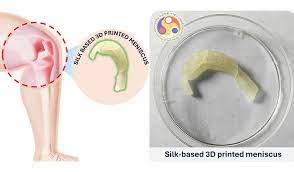Researchers from the Indian Institute of Technology (IIT) Guwahati have made a groundbreaking announcement on Thursday, unveiling three innovative treatment solutions for hard-to-treat knee meniscus tears. This development marks a significant step forward in addressing an injury that often poses challenges for patients due to its impact on knee joint functionality.
A knee meniscus tear typically occurs due to trauma to the knee meniscus, a crucial cushioning tissue in the knee joint, which can result from sudden accidents, sports-related mishaps, or the natural aging process. Such tears can severely impair an individual’s ability to walk, run, or engage in everyday activities.
In collaboration with the University of Animal and Fishery Sciences, Kolkata, the researchers at IIT Guwahati have devised three hydrogel formulations comprising blends of silk fibroin and other polymers. Silk fibroin, known for its strength, bioactivity, and flexibility, forms the core component of these formulations, making them promising candidates for treating meniscus injuries.
Notably, these treatment solutions offer several advantages over commercially available polyurethane and collagen meniscus implants. They are not only cost-effective but also customizable for each patient, potentially reducing the risk of future complications such as osteoarthritis.
Professor Biman B. Mandal from the Department of Biosciences and Bioengineering at IIT Guwahati explained, “We have developed regenerative treatment approaches tailored to individual patients, facilitating rapid healing of meniscus tears or replacing damaged tissue. Our methodology accounts for the variability in shape and size of the meniscus across different age groups, and incorporates growth factors to enhance healing.”
Among the developed formulations is an injectable hydrogel, designed for minimally invasive administration directly into the meniscus site to accelerate healing of smaller injuries. Additionally, the researchers have devised two 3D bio-printable inks capable of being 3D printed into implants, offering further versatility in treatment options.
The findings detailing these innovative approaches have been published across two international journals, Applied Materials Today and Advanced Biology. Professor Mandal emphasized the urgent need for personalized, affordable 3D meniscal implants in clinical settings, citing challenges associated with existing artificial implants, including infection risks and mechanical compliance issues.
The breakthrough achieved by the researchers at IIT Guwahati holds promise for revolutionizing the treatment landscape for knee meniscus tears, offering hope to countless individuals grappling with this debilitating condition.











